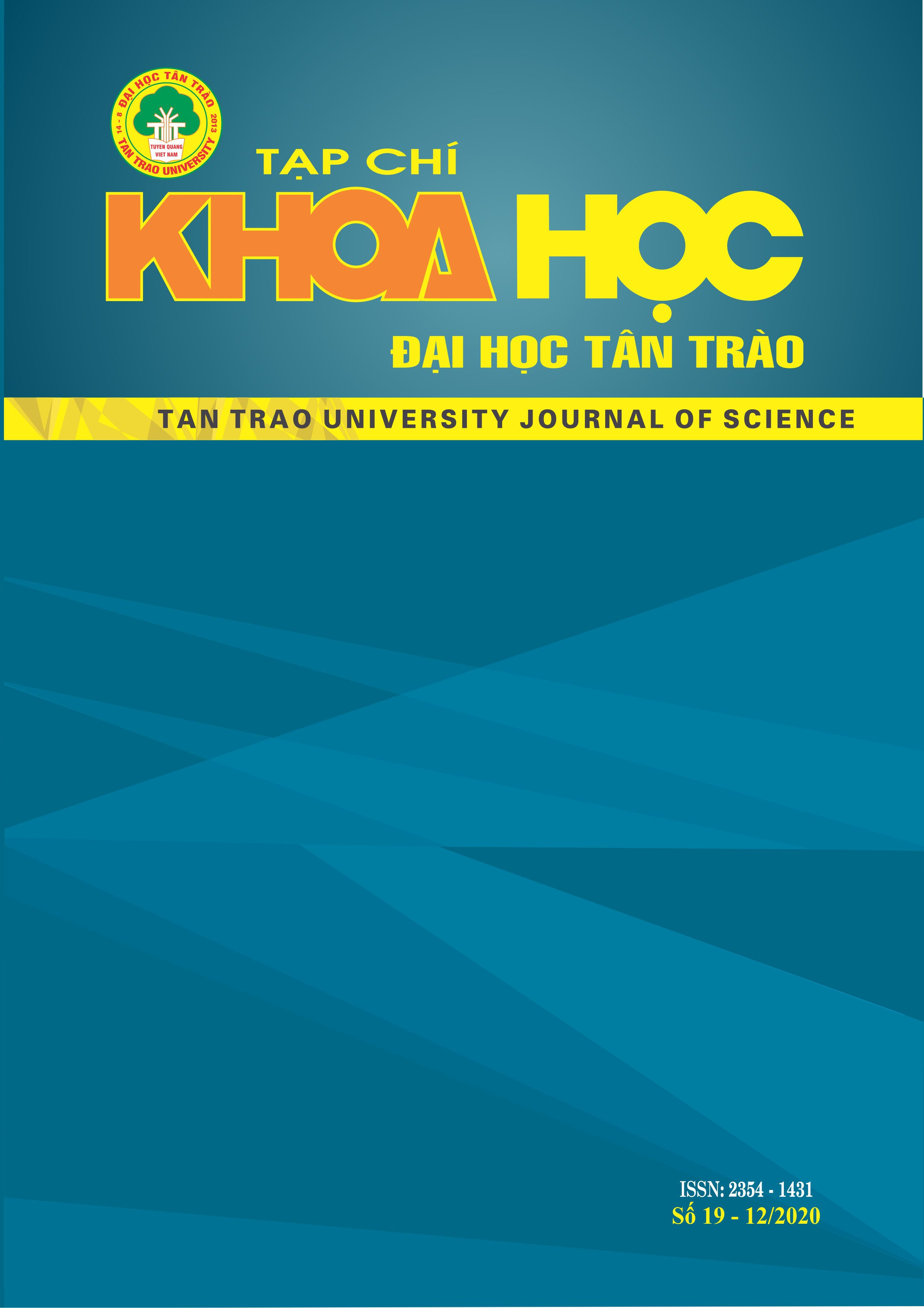NHỮNG YẾU TỐ QUYẾT ĐỊNH ĐẾN KỸ NĂNG GIAO TIẾP TỐT NHẰM NÂNG CAO KHẢ NĂNG THUYẾT TRÌNH CỦA SINH VIÊN CHƯƠNG TRÌNH TIÊN TIẾN TẠI TRƯỜNG ĐẠI HỌC NÔNG LÂM THÁI NGUYÊN
DOI:
https://doi.org/10.51453/2354-1431/2020/432Từ khóa:
kỹ năng giao tiếp, nâng cao, thuyết trình, sinh viên chÆ°Æ¡ng trình tiên tiến, trÆ°á»ng Äại há»c Nông LâmTóm tắt
Nghiên cứu được tiến hành tại trường Đại học Nông Lâm Thái Nguyên, năm học 2019-2020. Phương pháp mô tả được sử dụng trong nghiên cứu này. Độ trung bình, độ lệch chuẩn và phân tích quy hồi tuyến tính là phương pháp thống kê được sử dụng để tìm ra mức độ trung bình của các yếu tố quyết định đến khả năng giao tiếp tốt của sinh viên chương tình tiên tiến xét về mặt tiếp xúc với tiếng Anh, ngữ pháp và từ vựng, sự thành thạo, niềm đam mê với tiếng Anh và sự tự tin; mức độ trung bình bài thuyết trình của sinh viên xét về mặt diễn đạt, trình bày, ngữ điệu, phát âm, và chiếu bằng giọng nói; và ảnh hưởng quan trọng của việc tiếp cận với tiếng Anh, ngữ pháp và từ vựng, sự thành thạo, niềm đam mê với tiếng Anh và sự tự tin trong việc trình bày bài thuyết trình của sinh viên.
Tải xuống
Tài liệu tham khảo
1. Adams, K. (2004). Modelling success: Enhancing international postgraduate research students’ self-efficacy for research seminar presentations. Higher Education Research & Development, 23(2), 115-130.
2. A. Kanu and S. Durham (2016). Processing Public Speaking: Perspectives in Information Production and Consumption.
3. Carter, R., & Nunan, D. (2001). The Cambridge Guide to Teaching English to Speakers of Other Languages.Cambridge: Cambridge University Press.
4. Derwin, Tracey M. et., al. (2018). Second Language Accent and Pronunciation Teaching: A Research-Based Approach
5. Dudley-Evans, T. (1998). Developments in English for Specific Purposes: A multi-disciplinary approach. Cambridge University Press.
Tải xuống
Đã Xuất bản
Cách trích dẫn
Số
Chuyên mục
Giấy phép

Tác phẩm này được cấp phép theo Giấy phép Quốc tế Creative Commons Attribution-ShareAlike 4.0 .
Bài báo được xuất bản ở Tạp chí Khoa học Đại học Tân Trào được cấp phép theo giấy phép Ghi công - Chia sẻ tương tự 4.0 Quốc tế (CC BY-SA). Theo đó, các tác giả khác có thể sao chép, chuyển đổi hay phân phối lại các bài báo này với mục đích hợp pháp trên mọi phương tiện, với điều kiện họ trích dẫn tác giả, Tạp chí Khoa học Đại học Tân Trào và đường link đến bản quyền; nêu rõ các thay đổi đã thực hiện và các nghiên cứu đăng lại được tiến hành theo cùng một bản quyền.
Bản quyền bài báo thuộc về các tác giả, không hạn chế số lượng. Tạp chí Khoa học Tân Trào được cấp giấy phép không độc quyền để xuất bản bài báo với tư cách nhà xuất bản nguồn, kèm theo quyền thương mại để in các bài báo cung cấp cho các thư viện và cá nhân.
Mặc dù các điều khoản của giấy phép CC BY-SA không dành cho các tác giả (với tư cách là người giữ bản quyền của bài báo, họ không bị hạn chế về quyền hạn), khi gửi bài tới Tạp chí Khoa học Đại học Tân Trào, tác giả cần đáp ứng quyền của độc giả, và cần cấp quyền cho bên thứ 3 sử dụng bài báo của họ trong phạm vi của giấy phép.






